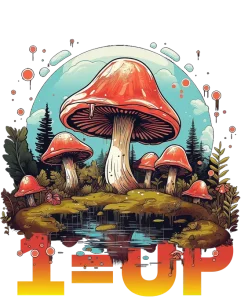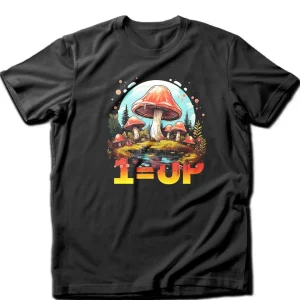Magic mushrooms, also known as psilocybin mushrooms, are a hot topic these days due to their potential to change the world. But what exactly are magic mushrooms, and how do they work? In this blog, we will explore everything you need to know about magic mushrooms. From their history of ancient use and cultural significance to the modern-day usage and legal status of these psychedelic fungi. We will also delve deeper into how they affect the brain and discuss the potential therapeutic benefits they offer. However, we cannot ignore the side effects and risks associated with their use. Therefore, we will also highlight some of the potential downsides that should be considered before trying them out. Lastly, we will touch on microdosing and what it implies for future use of magic mushrooms as a tool for personal growth and healing. So sit back, relax, and let’s explore the world of magic mushrooms together!
Understanding Shrooms
Magic mushrooms, a type of psychedelic fungus, contain psilocybin, the main psychoactive compound. When consumed, these mushrooms can induce hallucinations and alter perception. Research suggests that they may have therapeutic potential for mental health issues. To ensure safe usage, it is important to consider factors such as dosage, set, and setting. These mushrooms should be used responsibly and in a relaxed environment, taking into account one’s physical and mental state. It is crucial to avoid drug abuse and the use of other drugs while under the influence of magic mushrooms. Understanding the effects and risks associated with this type of drug is essential for a pleasant and positive experience.
What are Magic Mushrooms?
Shrooms, also known as psilocybin mushrooms, contain the psychedelic compound psilocybin. They are dried and consumed orally, producing altered perception, euphoria, and spiritual experiences. These fungi have a long history in various cultures worldwide, but their legality varies across countries and jurisdictions.
Different Types of Magic Mushrooms
Magic fungi come in a variety of species, each with its own unique properties. Among the commonly known types are Psilocybe cubensis, Psilocybe semilanceata, and Psilocybe cyanescens. These different types of magic mushrooms can vary in potency and effects, so it is crucial to properly identify and understand the specific species being consumed. Some species may be considered more potent or desirable than others. It’s important to note that the effects of magic mushrooms can differ from person to person, and factors such as dosage, set, and setting can influence the experience. Understanding the different types of magic mushrooms can enhance one’s knowledge and ensure a safe and enjoyable psychedelic journey.
The History of these Mushrooms
Psychedelic shrooms have a rich and diverse history spanning thousands of years. These psychedelic fungi have been used in various cultural and religious practices since ancient times. Civilizations such as the Aztecs and Mayans regarded magic mushrooms as sacred, valuing their spiritual and healing properties. In the 20th century, magic mushrooms gained popularity among counterculture movements and psychedelic enthusiasts. However, the legal status of magic mushrooms has fluctuated throughout history, with some countries prohibiting their use while others allow for certain forms of use. Today, modern research into the therapeutic potential of magic mushrooms has reignited interest in their history and cultural significance.
Ancient Use and Cultural Significance
Ancient cultures, like the indigenous peoples of Mesoamerica, embraced the use of magic mushrooms for spiritual and shamanic purposes. These mushrooms held immense importance in religious ceremonies, serving as a gateway to higher realms of consciousness. Experienced individuals guided these sacred practices, establishing a foundation for our present-day understanding and appreciation of magic mushrooms. Remarkably, there are indigenous communities that continue to honor their cultural heritage and spiritual traditions by incorporating magic mushrooms into their rituals. Through millennia, the ancient use and cultural significance of magic mushrooms have endured, demonstrating the enduring power these psychedelic fungi hold.
Modern Usage and Legal Status
In many countries, the use of magic mushrooms is considered illegal and falls under the category of controlled substances. However, there are specific jurisdictions that have decriminalized or even legalized the use of psychedelic mushrooms for certain purposes, such as medical or therapeutic use. This has given rise to underground psychedelic therapy and retreat centers, which aim to provide a controlled and supportive environment for individuals seeking the benefits of magic mushrooms. The growing body of scientific research on the therapeutic potential of magic mushrooms has fueled advocacy for their legalization or reclassification. As attitudes and perceptions towards psychedelics continue to shift, the legal status of magic mushrooms is constantly evolving.
The Psychedelic Properties of Magic fungi
They contain a compound called psilocybin. When ingested, psilocybin is converted to psilocin in the body, leading to psychedelic effects. These effects are primarily due to psilocin’s interactions with serotonin receptors in the brain, which influence perception, mood, and cognition. It’s important to note that the effects of magic mushrooms can vary widely depending on factors such as dosage, set (mental state), and setting (environment). The psychedelic experience induced by magic mushrooms can include sensory distortions, altered sense of self, and profound insights. While magic mushrooms have been compared to other psychedelic drugs like LSD, DMT, and mescaline, each substance has its own unique properties.
How Do shroomies Affect the Brain?
Psilocybin, the active compound in these mushrooms, interacts with serotonin receptors in the brain, leading to increased neural activity and communication. This can result in altered perceptions, enhanced creativity, and profound introspection. Magic mushrooms may also promote neuroplasticity and facilitate new ways of thinking.
The Impact of Environment on the Psychedelic Experience
The psychedelic experience induced by consuming magic mushrooms can be profoundly influenced by the set and setting in which it takes place. Set refers to an individual’s mindset, expectations, and mental state prior to taking magic mushrooms. On the other hand, setting refers to the physical and social environment where the psychedelic experience occurs. Creating a relaxed and safe environment, surrounding oneself with supportive companions, and playing appropriate music can enhance the magic mushroom experience. Conversely, being in a crowded or unfamiliar environment, experiencing negative emotions, or encountering stressful situations can increase the chances of having a challenging or difficult trip. Considering these factors is crucial to ensuring a positive and transformative psychedelic experience.
Potential Benefits of Mushrooms
Psilocybin fungi offer potential benefits in the treatment of various mental health conditions such as depression, anxiety, and PTSD. Extensive clinical trials and research studies have demonstrated their ability to alleviate symptoms and improve overall well-being. The therapeutic effects of magic mushrooms can be attributed to their ability to induce profound insights, promote emotional processing, and enhance psychological flexibility. Additionally, magic mushrooms have been associated with increased openness, creativity, and spiritual experiences. Ongoing research and clinical trials are being conducted to further explore their therapeutic potential and expand their approved medical applications. Through these efforts, magic mushrooms may revolutionize the field of mental health treatment.
Therapeutic Uses of Psilocybin
Psilocybin, a psychedelic drug found in magic mushrooms, has shown promise in treating various mental health issues. Clinical trials have demonstrated its potential in alleviating symptoms of depression and anxiety. The profound experiences induced by magic mushrooms with psilocybin can have long-lasting positive effects on mental health, allowing individuals to gain insights and perspectives on their life situations. Research suggests that psilocybin therapy can be effective in treating conditions such as post-traumatic stress disorder (PTSD) and major depressive disorder. With further exploration and ongoing clinical trials, the therapeutic uses of psilocybin may hold great potential in revolutionizing mental health treatment.
Can they Ease Depression and Anxiety?
Psilocybin, the active compound in mushrooms, shows promise in alleviating symptoms of depression and anxiety. Clinical trials indicate that psilocybin-assisted therapy can lead to significant reductions in depressive and anxious symptoms. The calming and relaxing effects of magic mushrooms may provide relief for individuals struggling with these mental health conditions. The psychedelic experience can also offer new perspectives on mental health struggles and enhance the effectiveness of therapy.
Risks and Side Effects
Although generally considered safe, they can come with risks and side effects. The use of these psychedelic drugs can lead to hallucinations, changes in perception, and an altered sense of time. It’s important to note that some individuals may experience what is known as a “bad trip,” which involves intense feelings of anxiety and distress. Physiologically, magic mushrooms can cause an increase in heart rate and blood pressure. To minimize the risk of negative experiences, it is crucial to use magic mushrooms in a safe environment and at a safe level. Taking precautions and being mindful of one’s mental state and surroundings can help ensure a more positive and potentially transformative journey.
Understanding ‘Bad Trips’
A “bad trip” refers to a negative and unpleasant experience that can occur while under the influence of psychedelic mushrooms. Several factors, including a person’s state of mind, their environment, and the potency of the drug, can contribute to the likelihood of having a bad trip. During a bad trip, individuals may experience intense anxiety, paranoia, and feelings of overwhelming stress. It is crucial to be in a relaxed and supportive environment when navigating through a bad trip. Adequate guidance and preparation beforehand can help minimize the risk of a bad trip, ensuring a safer and more positive psychedelic experience.
Long-term Effects of Use
While the long-term effects of magic mushroom use are still being studied, research suggests that the use of psilocybin mushrooms is generally not associated with long-term negative effects on mental health. In fact, some individuals report positive changes in their outlook on life and overall well-being after using magic mushrooms. However, it’s important to note that long-term effects may vary depending on individual factors such as frequency and dosage of use. Therefore, it is crucial to approach magic mushroom use responsibly, being aware of the potential risks and benefits. By doing so, individuals can make informed decisions and create a safe environment for their psychedelic experiences.
How does Microdosing Work with Magic Mushrooms?
Microdosing involves taking small doses of magic mushrooms, which are believed to enhance creativity, focus, and overall well-being. This rising trend has gained attention for its potential therapeutic benefits, offering individuals the benefits of magic mushrooms without intense psychedelic effects.
The Rising Trend of Microdosing
In recent years, microdosing with magic mushrooms has become increasingly popular. Individuals are turning to microdosing as a means of enhancing cognitive performance and improving their mental well-being. Advocates of microdosing claim that it can boost creativity, productivity, and alleviate symptoms of depression and anxiety. The accessibility of information and anecdotal reports online have contributed to the rising trend of microdosing. As research surrounding microdosing continues, scientists are further exploring its potential benefits and risks. It is important to note that microdosing involves taking sub-perceptual doses of magic mushrooms, allowing individuals to experience the positive effects without the intense psychedelic experience.
What is the Future of these fungi?
Though they are currently considered illegal drugs in most states the future of magic mushrooms is promising, with potential applications in mental health, emotional health, and overall health and ongoing scientific research. Clinical trials are exploring the use of psilocybin for mental health conditions. Growing public interest and advocacy have led to decriminalization and legalization in some areas. Continued research and education will shape the future of magic mushrooms and their potential benefits.
Conclusion
In conclusion, psychedelic mushrooms have the potential to change the world in a positive way. Their therapeutic uses have shown promising results in treating mental health conditions such as depression and anxiety. The psychedelic properties of magic mushrooms can help individuals gain new perspectives and insights, leading to personal growth and spiritual experiences. However, it is important to understand the risks and side effects associated with magic mushroom use, including the possibility of “bad trips” and long-term effects. The rising trend of microdosing with magic mushrooms also opens up new possibilities for cognitive enhancement and creativity. As research and understanding of magic mushrooms continue to evolve, their future holds exciting prospects for both medical and recreational purposes.


